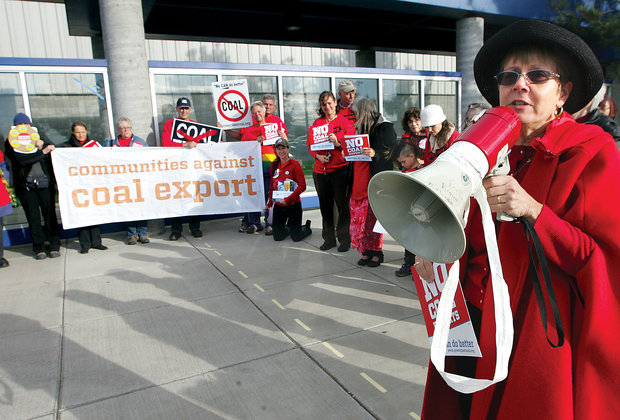A number of Mid-Columbia farmers showed support for a proposed Western Washington coal export terminal, saying it would benefit agriculture at a Tuesday hearing in Pasco.
About 250 people attended the hearing at the TRAC center to weigh in on an environmental study for the facility, the third of five planned hearings on the Millennium Bulk Terminals project.
About 1,300 people attended the first hearing in Longview, where the proposed terminal would be located, and 500 attended a meeting in Spokane.
Franklin County farmer Randy Mullen, president of the National Potato Council, said the coal terminal would lead to BNSF Railway improving its tracks through the Tri-Cities.
“Any time that we could improve our infrastructure to get our goods to ports is good for agriculture,” he told the Herald at an event at the Pasco Holiday Inn Express before the hearing. “With Washington being so trade dependent, good infrastructure is vital to our economy.”
BNSF spends about $125 million in infrastructure improvements each year in Washington, spokeswoman Courtney Wallace said. “That’s something we continually do: We expand capacity when there’s a market demand for it,” she said. “If there’s a business that warrants expanding capacity, we’ll certainly invest in that.”
Supporters of the proposed coal export terminal wore blue to the Pasco meeting, while opponents dressed in red Tuesday evening.
Many of the supporters were among the 37 people who now work at Millennium’s operating plant in Longview. The plant is seeking to expand to transport coal from trains onto boats for export to Asia. Millennium officials said the plant would add 1,350 direct jobs during construction and 135 permanent positions, while providing hundreds of millions of dollars in economic impact.
About 40 coal opponents rallied outside TRAC before the three-hour hearing. They came from Western Washington, Idaho and Oregon, but a handful were Tri-Citians.
Lora Rathbone of Richland said she was concerned about how coal being shipped to China could affect climate change. “Whatever we can do to stop something from happening, I think we need to do that,” she said.
The Tri-Cities will see more traffic delays because of 16 trains coming through each day and also potential derailments, said Marjorie Reinig of Kennewick.
“I feel like we need to focus on renewable energy for both jobs and to stop climate change,” she said. “By allowing coal to come through, we’re allowing more CO2-type energy.”
Inside TRAC, dozens spoke about the proposed coal terminal. The audience wasn’t allowed to clap, but people held up small signs reading “More Exports. More Jobs” and “Stop Coal,” while giving thumbs-up or thumbs-down gestures to speakers.
The Washington Department of Ecology’s 19-month process to set up the environmental review has been too slow, said Stephanie Swanberg of Pasco.
“I am actually so tired of things not moving forward, especially in our government,” she said. “We need to stop wasting time. I think that extreme environmentalists sometimes get in the way of progress.”
Ecology and Cowlitz County are conducting environmental impact studies at the state level, while the Army Corps of Engineers is performing a federal study. The Corps was not represented at the hearing because of the federal government shutdown.
Seven state legislators and county commissioners spoke at the hearing, all in favor of the coal terminal.
Franklin County Commission Chairman Rick Miller said he feared that Ecology would use the “global review standard” in evaluating the Millennium terminal’s environmental impact, like it did with the planned Gateway Pacific terminal near Bellingham. That takes into account the environmental damage coal could do if shipped out of the country.
“I know our state is dependent on our trade and export industry, which is why I strongly oppose the unprecedented review our state is imposing here,” he said.
Millennium Bulk Terminals CEO Ken Miller told the Herald before the hearing his terminal would be served by eight 125-car coal trains a day, which would then return empty through the Tri-Cities to be reloaded in Wyoming, Montana, Utah and Colorado.
The Millennium terminal differs from the Gateway Pacific coal terminal because Gateway wants to build on an undeveloped “greenfield” site. He said the 500-acre location where Millennium wants to build served as a Reynolds Aluminum smelter for 72 years. Millennium, a partnership between Australia-based Ambre Energy and Arch Coal of St. Louis, wants to clean up the site, which it now leases from Northwest Alloys-Alcoa.
The Millennium site also would have less impact than a planned coal terminal in Boardman, Ore., because that would have to ship coal on barges through the Columbia River Gorge before being switched to ships to cross the sea, Ken Miller said.
Millennium is located 60 miles from the mouth of the Columbia, so coal can be directly loaded there.
“This project is not the cause of power plants being built in Asia,” Ken Miller said. “That’s the way the coal business has always worked — it reacts to the demand for electricity.”
Millennium would like to have the coal terminal operational by late 2017 or early 2018.
The remaining hearings will be held Oct. 9 in Ridgefield and Oct. 17 in Tacoma.
Read the full article here.


